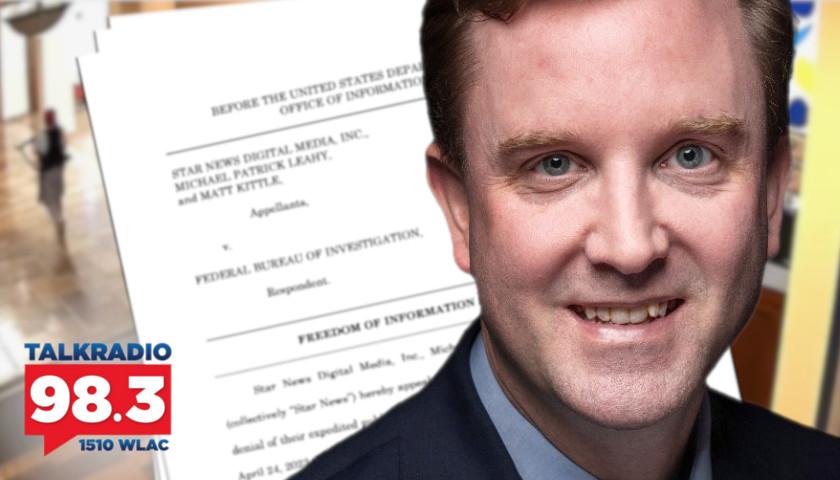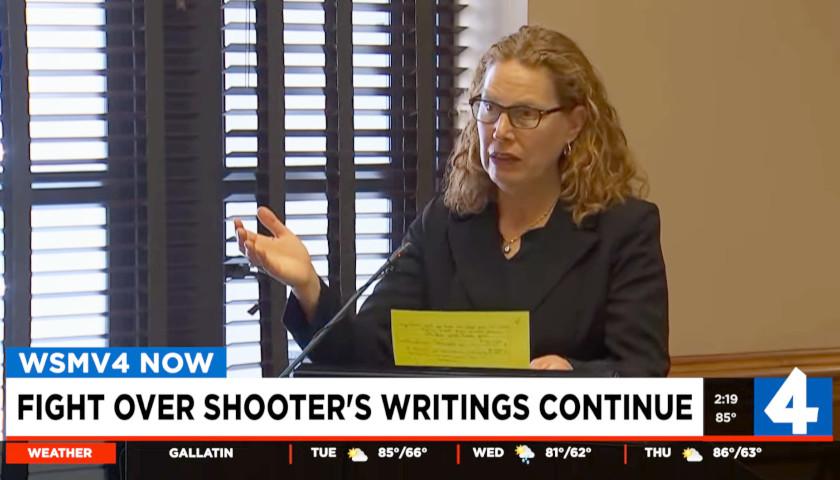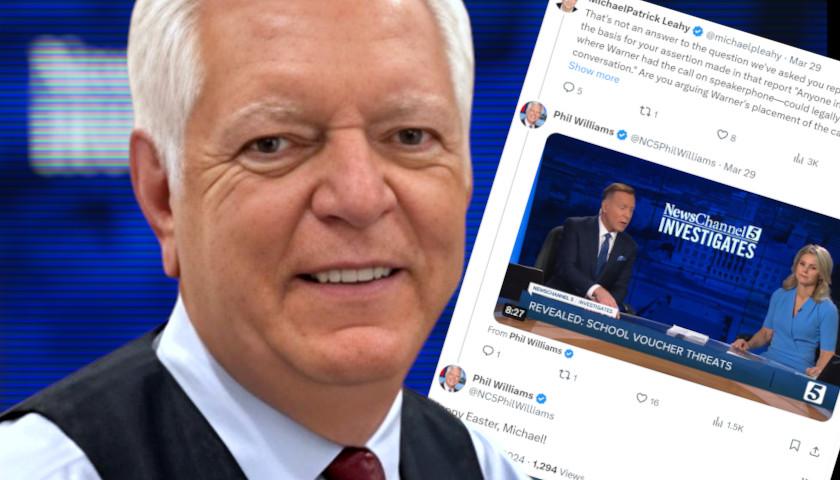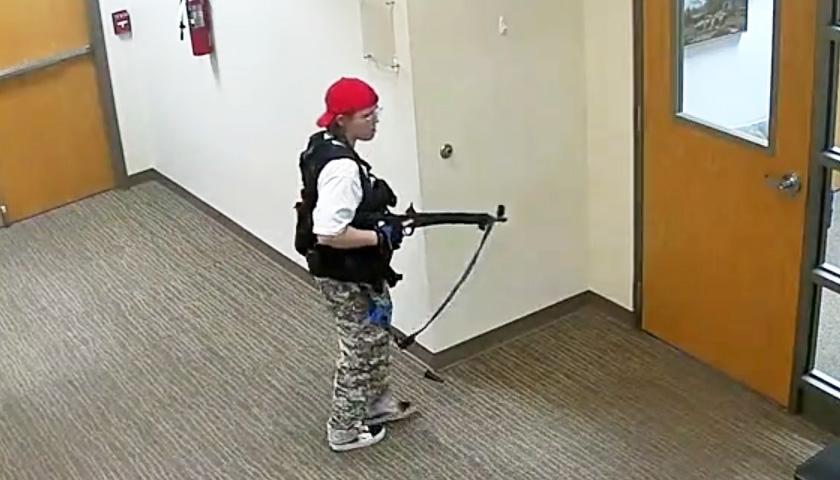Live from Music Row Friday morning on The Tennessee Star Report with Michael Patrick Leahy – broadcast on Nashville’s Talk Radio 98.3 and 1510 WLAC weekdays from 5:00 a.m. to 8:00 a.m. – host Leahy welcomed attorney Dan Lennington with the Wisconsin Institute for Law and Liberty to the newsmaker line to discuss the legal process in which they intend to obtain the Hale Manifesto regarding the Nashville Covenant School shooting.
Leahy: We welcome to our newsmaker line, my new best friend, Mr. Dan Lennington, deputy counsel for the Wisconsin Institute for Law and Liberty. Good morning, Dan.
Lennington: Morning. Thanks for having me on.
Leahy: We’re delighted to have you on here. Briefly, the Wisconsin Institute for Law and Liberty, you are a public interest law firm.
Lennington: Correct. Yes, we’re a public interest law firm. We’re based in Milwaukee, but we do nationwide work. We do the government typically, and we assert our rights under the Constitution. We do First Amendment rights, we do Second Amendment rights.
We do cases about the size and scope of the government, and we file cases nationwide. We’ve also filed cases in Tennessee and we’ve gone after the Biden administration. This is now our ninth legal action against the Biden administration. We’re very active and we never charge our clients anything.
Leahy: I love that part about it. And we are your client now, Dan. And you are representing us in legal action against the FBI to secure what’s called the Covenant Manifesto, the writings of 28-year-old Audrey Hale who killed six innocent Christians on March 27th here in Nashville.
Tell us a little bit about why we approached you because this quote manifesto is held by Metro Nashville Police Department and the FBI. Explain to our audience why we’re focused on the FBI first and what the particular legal action is.
Lennington: I’ve had two experiences in my legal career that really help me with this case. One is I’m a former federal prosecutor, and I used to work very closely with the FBI in Oklahoma City and I also used to run Wisconsin’s open government office here.
And so one, one of the things I learned in dealing with open records and dealing with the FBI is that when there is a record that the FBI holds, even if it’s held by a police department or sheriff or the local state, the feds really hold the key. And there are state laws. It’s true in Tennessee, it’s true in Wisconsin and a lot of states, they say that if the feds tell you can’t turn over the document, you can’t turn over the document.
You did file a public records request with . . . Metro [Nashville Police Department], which is important but also for us to file this new legal action against the FBI is really the way to get the key to the document because they’re the ones who are going to be ultimately deciding whether this record is turned over.
And so our first step is filing this case with the Department of Justice Office of Information Policy. And if we get an unfavorable decision from them, if they don’t turn it over within 20 days, we go to federal court in Nashville and the FBI is going to have to stand before a federal judge in Nashville and explain why they’re not going to turn over this manifest
Leahy: And really what the legal action that you’ve initiated on our behalf is basically we sent a FOIA request to the FBI. They denied it. And now the legal action is an appeal of that denial to an administrative law judge. Is that correct?
Lennington: Yes when you deal with the government, if you have a claim against the government, one of the things they make you do is they say you have to exhaust the administrative appeals, which means that you have to file legal actions up through the departments in Washington up to the heads of the departments in Washington and make sure that they’re really telling you no.
And then when they really tell you no in the administrative appeal, then you get to go to the other branch of government. You get to go to the United States District Court. Our federal courts then get to take jurisdiction over the matter. And so that’s a big deal for a federal judge to take jurisdiction over the FBI. So they just want to make sure they have all their ducks in a row before that happens.
Leahy: Now we’ve also filed under Tennessee Law, a public records request with Metro Nashville Police Department to get that manifesto. They denied it citing Rule 16, which says you can’t get documents from an open investigation. Now here’s what’s new to our listeners which is the following. Governor, Bill Lee last night at 8:15 pm tweeted this out.
We’ve been in touch with the Nashville Police Department and today Chief Drake assured me that, listen to this, documents and information regarding the shooter will be released to the public very soon. Let me repeat that. The governor said documents and information regarding the shooter will be released to the public very soon. That seems to me Dan, to be a very qualified description of what would be released. Your thoughts.
Lennington: When, I went back and looked at all the news reports and these are the words that, the chief there in Nashville, he said, manifesto. He said, we have the manifesto or he said we have a manifesto. That was on day one. That was March 27th. But I went back and looked at press reports and I’ve seen these leaks coming out gradually from people who’ve seen it and they say it’s writings plans, and journal entries.
They said at one time, 25 journals. They said two memoirs. They said a suicide note and then they said five laptops. So I do appreciate the fact that law enforcement is trying to walk back a little bit the term manifesto because it appears there’s not a manifesto in the same way as Ted Kazinski the UN Bomber had a manifesto, one document all in one place.
What we’re asking for are the documents that show her motivations for what she did and her plans for what she did. Now if she’s, writing in her journal about kitty cats five years ago, we don’t need to see that. But if she’s talking about her plans, it’s important for the public to know why she did this, and how she did this.
It’s important for public safety. Overall, lack of transparency breeds public distrust, and that’s how we get conspiracy theories that the government is hiding things. And so people come up with their own reasons and it’s very easy to spell conspiracy theories, just to show us what her motivation was and give us the record.
Leahy: A very good point. Crom has a question for you.
Carmichael: Dan, I am as interested in her and maybe even more interested in her mental state. And whether or not she was under the care of a psychiatrist and whether or not she was being prescribed these very strong drugs that appear, as we’ve been told, on the labels which have a warning label that said these drugs may cause you to be homicidal or suicidal.
I’m as interested to know if she was taking those drugs as I am interested in the manifesto because those drugs could be driving whatever thoughts were going through her mind. Will we get that information as part of what you’re doing?
Lennington: We’ll have to wait and see first what we get. But what I would say about the issue of antidepressants and violence is that you’ve got down there in Nashville pressure building on legislators to “do something.” Public officials are being told, we’ve got to pass the laws. We’ve got to do something. Even if the president says we need more gun control. We’ve got the Tennessee Three down there.
We can’t really know what to do if we’re going to “do something” unless we know exactly what was going on with this killer. Now we do know there have been allegations in the past that some school shooters have been under psychiatric care and have been on anti-depressants, and I think that having a public debate over the cause of school shootings with mental health is very important.
Listen to today’s show highlights, including this interview:
– – –
Tune in weekdays from 5:00 – 8:00 a.m. to The Tennessee Star Report with Michael Patrick Leahy on Talk Radio 98.3 FM WLAC 1510. Listen online at iHeart Radio.
Photo “Dan Lennington” by Dan Lennington and “Covenant School Shooter” by Metro Nashville Police Department.








